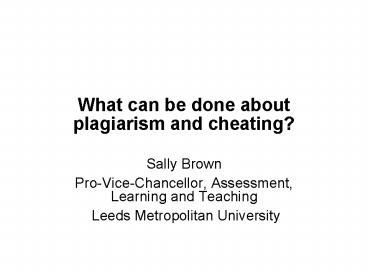What can be done about plagiarism and cheating - PowerPoint PPT Presentation
1 / 18
Title:
What can be done about plagiarism and cheating
Description:
Early work done with Liz McDowell in the nineties at the University of ... There is heightened awareness of its practice (particularly a media frenzy) ... – PowerPoint PPT presentation
Number of Views:28
Avg rating:3.0/5.0
Title: What can be done about plagiarism and cheating
1
What can be done about plagiarism and cheating?
- Sally Brown
- Pro-Vice-Chancellor, Assessment, Learning and
Teaching - Leeds Metropolitan University
2
This presentation owes a great deal to
- Early work done with Liz McDowell in the nineties
at the University of Northumbria that resulted in
a Red Guide and a publication on the ILTHE
website - The work of Jude Carroll, particularly a one week
residency at Leeds Metropolitan University in May
2006.
3
Everyone says plagiarism has increased. This may
be because
- Electronic practices make it really easy to do
- Its much easier nowadays (in the olden days, at
least you had to copy things out!) - There is heightened awareness of its practice
(particularly a media frenzy) - Students dont necessarily see anything wrong
with it.
4
Students plagiarise for all kinds of reasons
consciously because
- Im not really good enough to be here. Theyll
find me out soon enough - I havent got time to do it properly because
Ive got so much else to do - If they are stupid enough to give us 3
assignments with the same deadline, what can they
expect? - Its just so easy with the web
- I just couldnt say it better myself
5
Unconsciously they do it because
- They dont really understand the rules.
- They understand the rules but just get them
wrong. - They have poor academic practices (dont keep
good records, dont record where they got things
from etc.) - They are post-modern, eclectic,
Google-generationists, Wikipediasts, who dont
necessarily recognise the concepts of
authorships/ownerships.
6
Some of the questions they ask
- How much can I use? Is a single sentence OK?
- Does it count if I just say the same thing in my
own words? - Who am I to try and say it better than the
author/lecturer who can say it so much better
than me? - Why have the rules changed since I went to
school?
7
Are international students more likely to
plagiarise than home students? A contested topic
- Biggs, De Vita, Joughin and Carroll all have
different takes than this - Students from Confucian Heritage Cultures (CFCs)
some argue have a greater tendency to do so for
cultural reasons - Others argue that students who are struggling
tend to be more tempted to plagiarise (and
international students often struggle when they
are adapting to a new culture).
8
Where do they plagiarise from
- Other students (voluntary)
- Other students (involuntary)
- Themselves
- Text books and other books and printed sources
(more rarely nowadays) - Web accessed materials
- Commercial suppliers
- And..
9
And what about you and me?
- Recycling (How much do you plagiarise yourself?)
- Forgetting sources leading to sloppy statements
like research suggests everyone says
early work by.. etc - Forgetting you didnt originate something
yourself - And.
10
So what can we do? Four approaches
- Use strict controls
- Make the rules clear and have known penalties
- Design assessment instruments that make cheating
difficult - Develop a climate that will reduce the likelihood
of cheating.
11
Strategy 1 Use strict controls
- Use well-invigilated unseen, closed-book exams.
- Use computer-based tests.
- Conduct spot checks.
- Check for mark discrepancies.
- Check the identities of students being assessed.
- Install strict controls on high stakes
assessment and worry less about the rest.
12
Strategy 2 Make the rules clear and have known
penalties
- Help students to understand what are the rules of
the game. - Publicise the occurrences of cheating and
plagiarism that we identify and punish. - Students can help to police each other.
13
Strategy 3 Design assessment instruments that
make cheating difficult (1)
- Use open-book rather than closed book exams.
- Use assignments which draw on personal experience
and require evidence of it. - Ask students to produce reflective journals and
critical incident accounts. - Use vivas and orals to verify that work
undertaken is the students own - Design assignments which are different for each
student.
14
Strategy 3 Design assessment instruments that
make cheating difficult (2)
- Devise assignments which require choice and
individual activity related to specific contexts. - Use Computer-Based Assessment.
- Use assignments which need to be authenticated by
a third party. - Ask students to submit alongside their assignment
photocopied extracts from the key sources they
have used and to indicate how they have used them.
15
Strategy 3 Design assessment instruments that
make cheating difficult (3)
- Use group assessment.
- Involve an element of peer assessment.
- Give students tasks that require them working in
learning teams. - Monitor the production of assessed work.
16
Strategy 4 Develop a climate that will reduce
the likelihood of cheating
- Provide a good teaching and learning environment.
- Design assessment carefully that are fit for
purpose. - Help students to take control of their learning.
17
Strategy 4 Develop a climate that will reduce
the likelihood of cheating
- Provide assistance to students with difficulties.
- Develop student motivation.
- Consider students relationships with the course
and institution.
18
So what?
- We know what doesnt work in preventing
plagiarism, but do we know what does? - Can we differentiate between intentional and
unintentional plagiarism when we are dealing with
it (and does it matter?). - What are the best institutional and individual
ways in which we can combat plagiarism
effectively?

